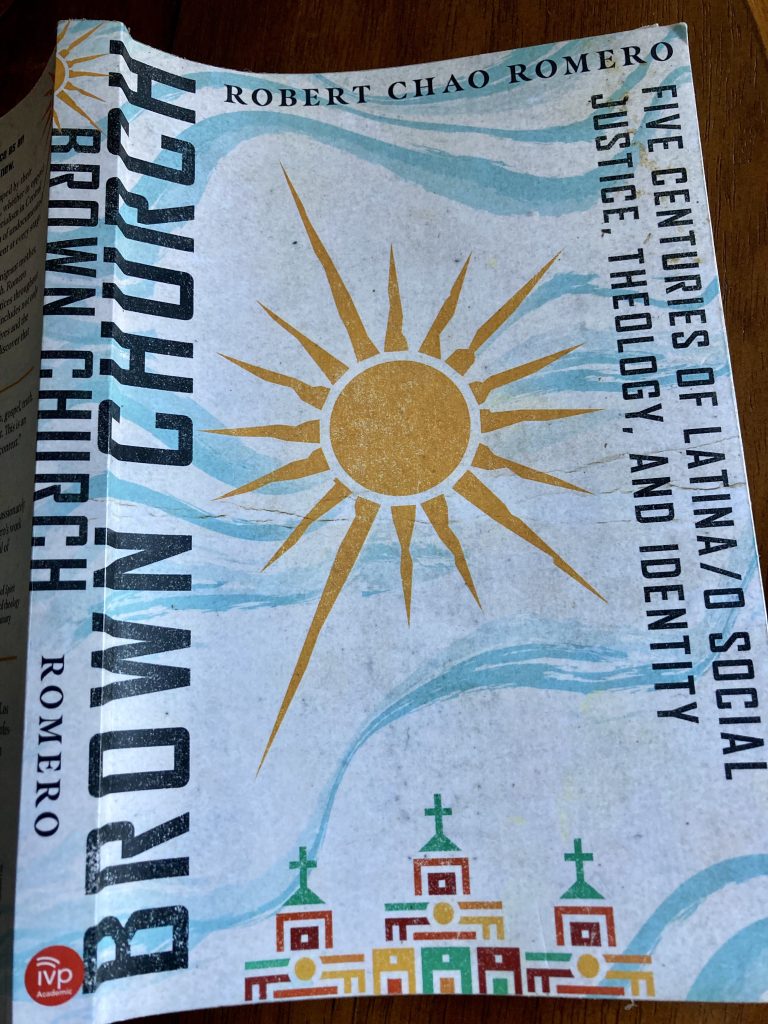Brown Church

Book Review “Brown Church”
Robert Chao Romero,
Inter Varsity Press, 2020
2023-03-03 – Reviewer, Scott Steward
In human years, I’ve interacted and thought a long time about what it is to be Christian, and what Christianity represents in people’s lives. Brown Church includes an expansive review of the origins of what I think was revolutionary in Jesus’ day, (“when God chose to dwell among us….he chose to be brown.”) and the universality of what it is to be Christ-like. Between Romero’s own declarations of faith, he delivers detailed and unabashed accounts of mistreatment of the colonizer Church. The chasm between what has been (colonization dominated Church) and what could be (Brown Church) may present a challenge for those that have come to Romero’s book for a way back to observance of faith through the Church.
Brown Church is a point of view that Indigenous/Latino/Latina Christianity’s salvation can be found in the voices of 500 years of emancipative social justice work (“Brown theologians throughout the centuries”), within the Church and in the laity, that dare to recognize the whole personhood of all varieties of afflicted brown people. Romero believes that Latino/Latinas would better identify with Christianity if they knew that “Jesus had a plan to, and his manifesto arose out of, the shared experience of social economic, political and cultural, colonization and marginalization,” and that they/we can/must depart from the colonizer claim on Christianity.
Amen and may it be so. Brown Church, for me, is good work, but Romero’ version of Brown Church does not part with spiritual exceptionalism, a point of view that insists that faithlessness prevents association with the divine and leads to dissolution. A point of view I believe Jesus refutes and did not espouse. The multiple heroin’s and heroes of Brown Church get close to what I believe about Jesus, but as most remained frocked, and one assumes Romero is correct, in that they too were yoked by the powers that enforce faith before absolution.
Robert Chao Romero, and I, want to see a history of a growing Brown Church. To make this point Romero draws from the first days of indigenous affliction. Then Guaman Pomo, 1550, wrote “The First New Chronicle of the Indies of Peru” that called out the Spanish conquistadors as contrary to the Christian faith and the indigenous of Peru as entitled to Christian self-government. Claim is also made that Christianity arrived to south America, with Saint Bartholomew, 150 years before the Spanish. Similarly, in 1746, Virgin De Guadalupe was forced on the mother church by the people seeing, through her, themselves as indigenously Christian. The question I have for Romero is, are these massive efforts, to find de-colonized Christian origin, an expression of the freely given human Christ-like spirit or evidence of the recolonization of that spirit that would otherwise reclaim a full and healthy indigenous form?
Romero’s Brown Church is a rigorous account that follows a chronology of well-known Christian Latino/Latina experiences, from Caesar Chávez to Sor Juana. In describing Chávez’s rise to power, Romero shows us that the use of Christian metaphor of fasting and pilgrimage was essential to Chávez’s rise, and the absence of Christian observance led to his demise. It is for the reader to conclude whether or not Romero is appropriating Chávez into a theological description. Equal detail is provided in the recounting the intellectual ferocity of Juana Inés De La Cruz (Juana, Ramirez de Asbaje) circa 1651. Her story is worth the effort of every page of the rest of Romero’s book. To know Sor Juana existed is to know that God, in any form, comes to us. I am very grateful to Professor Romero for this recounting and the many others in Brown Church.
It is beyond this reviewers experience to know how Brown Church “mission integral” is received by the body of Christian movement. For me, Brown Church is a welcoming and, hopefully, a growing extension of liberation theology that recenters Christian work around the marginalized and honors lived experience to create beloved community: to expand the circle of love and care for all.
May we continue to share the work and care for each other.